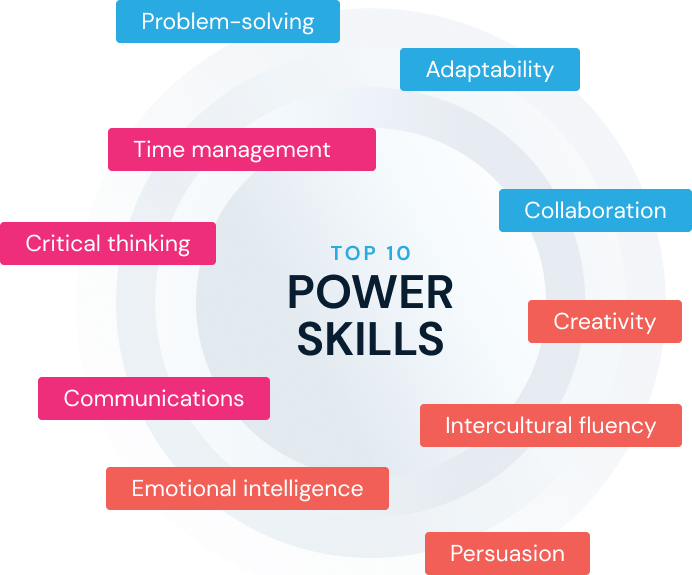Amid a changing work landscape and a deluge of technological advancements comes another shift; the kind of skills employees are required to have to be successful in the workplace. Previously, hard skills may have been the only keywords recruiters scoured for on resumes. But times have changed, and priorities have too.
Employers and recruiters are now looking for specific behavioural skills when choosing suitable candidates. These soft skills are now so highly regarded in the workplace that they are referred to as ‘power skills’ and are deemed essential to a business’s overall success.
What exactly are power skills, and how do you acquire them? Aren’t these natural abilities people are just expected to have? The answer is no. Individuals, managers and decision-makers, especially those in the financial, tech, commodities and facilities arenas, have a lot to gain by upskilling (or reskilling) their workers in power skills. Let’s take a closer look.
Hard skills, soft skills, power skills – what’s the difference?
Hard skills are the quantifiable ones. These skills are learnt during traditional education and range from IT to public speaking, operating heavy machinery, accounting, marketing, data analysis and project management. We still need them.
An interesting trend HR thought leaders such as Josh Bershin are seeing is that many companies are actively investing in technology and digital literacy to future-proof their companies. However, he argues that these skills will be easily filled, and we need to focus instead on people acquiring soft skills.
Soft skills are personal, behavioural skills (or traits). For instance, time management, creativity, teamwork, problem-solving, etc. Interestingly, the term originated in the US military in the 1950s when managers noticed that the way soldiers were led made all the difference in how well a unit executed their hard skills.
Fast forward to 2022, and Udemy Business’s Workplace Learning Trends Report renamed a selection of these skills power skills – the most important traits people need to be successful at any level within an organisation. Unfortunately, most people don’t have these skills, resulting in what’s termed the ‘skills gap’ – a fundamental mismatch between the skills that employers require of their employees and the skills they actually have.
In the Future of Jobs Report 2020, the World Economic Forum predicts the skills gaps will continue to be high as in-demand skills across jobs change leading up to 2025. The top skills they identified include critical thinking and analysis, problem-solving, and self-management skills such as active learning, stress tolerance, resilience, and flexibility.
The most in-demand soft skills
Stats from WeForum showed that roughly 15 – 20 million African youth will be entering the workforce over the next three decades, and one of the biggest obstacles to African businesses being able to compete with the global economy is our skills gap. Job board Adzuna showed that, in SA, the most in-demand power skills are problem-solving, time management and adaptability. With a lack of suitably skilled candidates and low employment rates, upskilling Africa’s future workforce remains our greatest challenge.
The top 10 power skills businesses need
There are dozens of soft skills that give employees an edge in the workplace, but these are what research shows are the most important power skills:

The benefits and barriers to acquiring soft skills
Power skills training for employees equips them with the confidence to communicate, resolve challenges, adapt to changes in the workplace, work better in diverse teams, and come up with novel solutions to problems. In the long term, investment in power skills can improve a business’ BEEE scoring. It can also help save money and improve talent retention while allowing greater flexibility to take advantage of growth opportunities.
Barriers employers face in upskilling or reskilling their workforce comes down to time, cost, employees’ resistance to change, and managers simply not knowing how to go about helping employees acquire these new skills. Luckily, we have a solution.
Skill up or lose out
Dr Veronique Genniker, Trust Director at Pearson Group SA, puts it:
“It is imperative to have a growth mindset that enables you to engage daily with complex problem solving, critical thinking, creativity, people management and emotional intelligence, which are now highly sought after by employers.”
MasterStart is answering this workplace priority by offering individuals, leaders and organisations the opportunity to fill the skills gap with a brand new work-readiness course in Power Skills Essentials.
As we see it, power skills aren’t just nice to have; they are essential to succeed and keep pace in an ever-changing workplace. If you are ready to learn these vital power skills and take your career or business to the next level, contact us to find out more about our 10-week Power Skills Essentials course.


